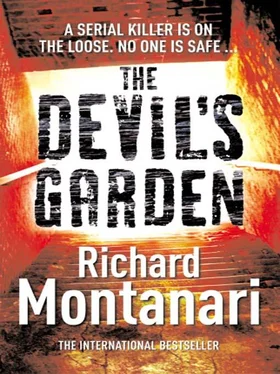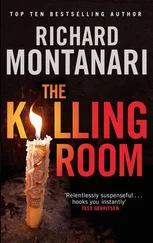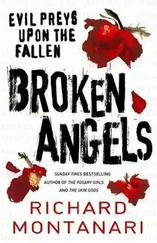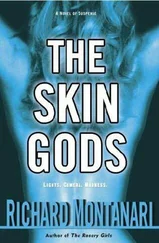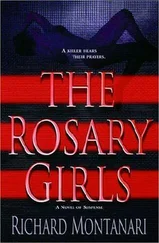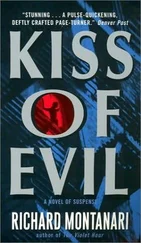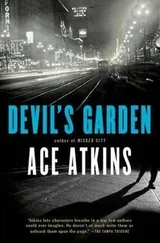Richard Montanari - The Devil_s Garden
Здесь есть возможность читать онлайн «Richard Montanari - The Devil_s Garden» весь текст электронной книги совершенно бесплатно (целиком полную версию без сокращений). В некоторых случаях можно слушать аудио, скачать через торрент в формате fb2 и присутствует краткое содержание. Жанр: Триллер, на английском языке. Описание произведения, (предисловие) а так же отзывы посетителей доступны на портале библиотеки ЛибКат.
- Название:The Devil_s Garden
- Автор:
- Жанр:
- Год:неизвестен
- ISBN:нет данных
- Рейтинг книги:4 / 5. Голосов: 1
-
Избранное:Добавить в избранное
- Отзывы:
-
Ваша оценка:
- 80
- 1
- 2
- 3
- 4
- 5
The Devil_s Garden: краткое содержание, описание и аннотация
Предлагаем к чтению аннотацию, описание, краткое содержание или предисловие (зависит от того, что написал сам автор книги «The Devil_s Garden»). Если вы не нашли необходимую информацию о книге — напишите в комментариях, мы постараемся отыскать её.
The Devil_s Garden — читать онлайн бесплатно полную книгу (весь текст) целиком
Ниже представлен текст книги, разбитый по страницам. Система сохранения места последней прочитанной страницы, позволяет с удобством читать онлайн бесплатно книгу «The Devil_s Garden», без необходимости каждый раз заново искать на чём Вы остановились. Поставьте закладку, и сможете в любой момент перейти на страницу, на которой закончили чтение.
Интервал:
Закладка:
They settled in Astoria, Queens, in a small apartment over a shuttered retail store on Ditmars Boulevard near Crescent Street.
In July 1973 Mikhail Romanov was born at Queens Hospital. The next day Peeter applied to have the family’s last name changed to Roman, figuring that, as the Cold War still raged, his son would not be served well by such a Russian-sounding name, especially one so patrician.
Two years later, with a credit union loan, Michael’s parents bought the retail space beneath their apartment, and opened a bakery. Word quickly spread among the local Estonian, Russian, and eastern European residents of the neighborhood. On a block that boasted both Greek and Italian bakeries there was now a place where one could purchase fresh brown breads, gingerbreads, piroshkis, rugalah and, every Easter, their beloved kulich. Patrons no longer had to travel to Rego Park for their kartoshka.
But what made the Pikk Street Bakery special – the shop was named after the street in Tallinn on which Peeter had proposed to Johanna – was its old-fashioned wooden shelves, its linen tablecloths, is luminous display of candy bins stuffed with an unbounded selection of gaily wrapped confections, which turned the place into every child’s fantasy.
Perhaps what made it even more special, especially for the young mothers in the neighborhood, was Johanna Roman’s exquisite Estonian lace. Michael’s fondest memory of his mother was her sitting on the fire escape in spring and summer, her steel needles blazing, chatting with neighbors, her tapestry bag at her feet, the tote with an Estonian cottage embroidered on its side. Booties, blankets, hats, sweaters, especially her delicate Haapsalu shawls – Johanna always gave away whatever she knitted.
Her nickname for Michael – a private nickname, one Johanna never uttered in front of Michael’s friends on the block – was nupp. A nupp was a particularly difficult maneuver in knitting, one that required the left-hand needle to penetrate five stitches. Some women in Johanna’s circle called it “Satan’s contribution to knitting,” but Johanna Roman always meant it as a term of endearment.
Good night my little nupp, she would say to her handful of a son.
Michael always slept well.
In 1980, on a blustery winter day, Michael arrived home from school to find a stranger in their small kitchen above the shop, a large rockpile of a man, with a wide forehead, zinc-colored eyes, and a deeply cleft chin. He wore a pilled woolen coat and boots gone round at the heel. He ate sardines from a can. With his fingers.
The man was Solomon Kaasik, his father’s childhood friend from Tartu. Peeter Roman had sponsored the man’s voyage to America.
Every Sunday, for many months, Solomon would come for Sunday dinner, often with a small present for Michael, never without something to add to the stew. He would drink Turi vodka and smoke cigars with Michael’s father well into the night. Some evenings he would play chess with Michael, sometimes letting the boy win.
In the spring of Michael’s eighth year, Solomon ceased visiting. Michael missed his loud laughter, the way he would throw him on his broad shoulders with ease. Finally Michael asked. His father did not answer him, but eventually Johanna took Michael aside one day and told him that Solomon had fallen in with some bad people, the local vory. Michael was not sure what the vory were exactly, but he knew to be afraid of them. After much nagging, Peeter told Michael that Solomon had gotten involved in the robbery of a bank in Brooklyn, a robbery where people had died. He said Solomon was now in a place called Attica and he was not coming back for a long time.
Although deeply saddened by these events, Peeter Roman visited Solomon often. When Michael turned nine, his father talked the guards into letting Michael see Solomon. To Michael, Solomon looked thinner, but harder. He had new markings on his arms. He no longer smiled.
On July 4, 1983, just a few weeks before Michael’s tenth birthday, he sat in the window overlooking Ditmars Boulevard. Below him, neighborhood kids threw cherry bombs, M80s, fired bottle rockets. Michael was forbidden to leave the house unaccompanied by his parents – there was always a story of a child losing a finger, an eye, something worse – so Michael leaned as far as he could out the window, the smells of spent gunpowder filling his head. The shop closed at seven PM. Every few seconds Michael would glance at the clock. At seven sharp he ran down the stairs.
At first he thought he had mistakenly taken the back stairs, for he heard none of the familiar sounds – the pans being washed and put away, the sound of the Hoover being run, doors locked, register closed out. But he was on the front stairs, and the shop was quiet.
Something was wrong.
Michael crouched on the stairs and looked into the shop. The plastic OPEN sign had not been turned around on the door. The neon display in the window still glowed.
By the time Michael rounded the platform at the bottom of the steps, he saw it. It was a picture that would live in his mind and heart forever.
The bakery was covered in blood.
Behind the counter, where his mother always stood, chatting with customers, filling white boxes with pastries and rolls, her laughter a sweet song soaring over the sounds of traffic on the street, the entire back wall had been painted crimson. The cash register had been pulled from the counter, and lay on its side, emptied, like a gutted dog. Michael saw his father’s creased brown shoes, ever covered in white flour, sticking out from behind the main oven, all around them thick dots of scarlet in the spilled sugar.
His heart black with fear, Michael crossed the room to where his mother lay bleeding. She did not open her eyes, but in the moment before she died she whispered softly to him.
“Zhivy budem, ne pomryom.”
It was an old Russian phrase meaning If we will be alive, we will not die.
Only much later would Michael learn what had happened. He would learn that two young men – not neighborhood men, Ukrainian men from somewhere called Red Hook – had come into the shop and demanded money. Once they had everything in the register, they cold-bloodedly shot Peeter and Johanna Roman. The sounds of the gunfire were masked by the sounds of the fireworks. While Michael sat upstairs, resenting his parents for being so old fashioned as to not let him play with fireworks, they lay below him, his father dead, his mother dying. Even at the age of nine he vowed to never forgive himself.
The police investigated the crime, but after six months or so the case went cold. Michael was taken in by cousins. He withdrew completely in his grief and sorrow, into the worlds of Jack London and Zane Grey. He didn’t speak for nearly a year. His grades suffered and he grew terribly thin. In his eleventh year he began to come out of it, and it was during that summer that news came to his household. Michael overheard his cousins talking of a grisly discovery made by police. It seemed that two men were found hanging from a girder beneath the Hell Gate Bridge near Nineteenth Street. The men were naked, brutally beaten, and had their genitals removed. Carved into their chests were two numbers: 6 and 4.
The address of the Pikk Street Bakery was 64 Ditmars Boulevard.
When Michael turned eighteen, and began what would become monthly visits to play chess with Solomon Kaasik, a tradition the two men maintained for many years, he walked into the room, met Solomon’s lupine eyes and, with a slight nod of Solomon’s great jaw, Michael knew. It was Solomon who had put the hit on the two men. Although Solomon could have revealed this many years earlier, he had waited for the right time. He had waited until Michael was a man.
It was in this moment that Michael Roman considered, for the first time in his life, the true heart of justice, both old world and new.
Читать дальшеИнтервал:
Закладка:
Похожие книги на «The Devil_s Garden»
Представляем Вашему вниманию похожие книги на «The Devil_s Garden» списком для выбора. Мы отобрали схожую по названию и смыслу литературу в надежде предоставить читателям больше вариантов отыскать новые, интересные, ещё непрочитанные произведения.
Обсуждение, отзывы о книге «The Devil_s Garden» и просто собственные мнения читателей. Оставьте ваши комментарии, напишите, что Вы думаете о произведении, его смысле или главных героях. Укажите что конкретно понравилось, а что нет, и почему Вы так считаете.
